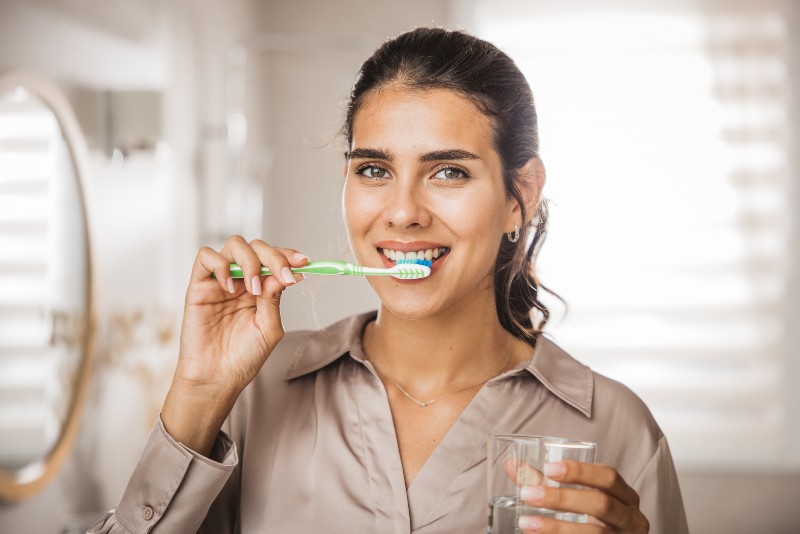Best Oral Hygiene Practices in Kanata & Stittsville, ON
Good oral hygiene forms the foundation of a healthy smile and overall well-being. Yet many people struggle with knowing exactly what steps to take for optimal oral health and hygiene. Poor dental care can result in cavities, gum disease, bad breath, and serious health complications. The good news? Establishing an effective oral hygiene routine doesn’t have to be complicated. You can maintain excellent dental health for years with the right techniques, products, and consistency. As you read below, we will walk you through everything you need to know about proper oral care, from brushing and flossing best practices to choosing the right products for your needs.
What Is a Good Oral Hygiene Routine?
An effective oral hygiene routine consists of daily practices that remove plaque, bacteria, and food particles from your teeth and gums. The cornerstone habits include brushing twice daily, flossing once a day, and using a mouthwash. However, the quality of your technique matters as much as frequency. Most dental professionals recommend brushing for two minutes in the morning and before bed, flossing at least once daily (preferably before bedtime), and rinsing with mouthwash to reach areas your toothbrush and floss might miss. Regular dental checkups every six months complete this routine by addressing issues before they become serious problems.
How to Effectively Brush Your Teeth
Proper brushing technique removes significantly more plaque than casual scrubbing. Start by choosing a soft-bristle toothbrush and fluoride toothpaste. Begin brushing at a 45-degree angle against your gumline, allowing the bristles to reach between your teeth and gums. Use gentle, circular motions rather than aggressive back-and-forth scrubbing, which can damage enamel and aggravate gums. Spend at least 30 seconds on each portion of your mouth, ensuring you clean the outer and inner surfaces and chewing surfaces of all teeth. Don’t forget to brush your tongue, which harbors bacteria that cause bad breath. Replace your toothbrush every three to four months, or sooner if the bristles become frayed. A worn toothbrush loses effectiveness and may harbor harmful bacteria.

The Best Way to Floss Your Teeth
Flossing removes unwanted plaque and food particles from between teeth where your toothbrush cannot reach. Despite its importance for oral health and hygiene, many people skip this crucial step or perform it incorrectly. Follow these oral hygiene instructions for proper flossing:
- Use about 18 inches of floss, wrapping most around your middle fingers and having about 2 inches to work with
- Hold the floss tightly between your thumbs and forefingers
- Guide the floss between teeth using a rubbing motion, never snap it into the gums
- Curve the floss into a C-shape against one tooth and slide it in between the gum and tooth
- Gently rub the floss up and down against the tooth surface
- Repeat this process for each tooth with a clean section of floss each time
Learn How to Choose the Best Products
Selecting appropriate oral care products can significantly impact your routine’s effectiveness. Not all toothpastes, mouthwashes, and dental tools are created equal, and your specific needs should guide your choices. Consider these factors when choosing oral hygiene products:
- Look for the American Dental Association (ADA) seal of acceptance on toothpastes and mouthwashes
- Choose fluoride toothpaste to help prevent cavities and strengthen enamel
- Select a soft-bristle toothbrush to avoid damaging gums and enamel
- Consider electric toothbrushes, which can be more effective at removing plaque than manual brushing
- Pick an antimicrobial mouthwash to reduce bacteria and freshen breath
- Avoid products with harsh abrasives or excessive whitening agents that may damage teeth
Are There Products for Sensitive Teeth?
Tooth sensitivity affects millions and can make maintaining good oral hygiene uncomfortable. Fortunately, specialized products can help manage sensitivity while still providing effective cleaning. Desensitizing toothpastes contain compounds like potassium nitrate or stannous fluoride that aids in blocking pain signals to tooth nerves. These products typically require several weeks of consistent use to show maximum effectiveness. Soft-bristled toothbrushes are essential for sensitive teeth, as more rigid bristles can worsen sensitivity and cause gum recession. Some people with sensitive teeth benefit from lukewarm water instead of cold water when brushing and rinsing. If sensitivity persists despite using specialized products, consult your dentist, as it may involve underlying issues requiring professional treatment.
Maintaining Your Oral Health for Life
Consistent oral hygiene practices and regular professional care form the best defense against dental problems. Remember that an oral hygiene routine for one person may need adjustments for another based on individual risk factors, existing conditions, and lifestyle considerations. At Villanova Dental, serving the Kanata and Stittsville, ON communities, we believe prevention is the best medicine for your smile. Our team can help you refine your oral hygiene routine and address any concerns about your dental health. Schedule your next appointment to ensure your oral care routine works effectively for your unique needs.


 1261 Stittsville Main Street, Unit #9
1261 Stittsville Main Street, Unit #9
 1261 Stittsville Main Street
1261 Stittsville Main Street


